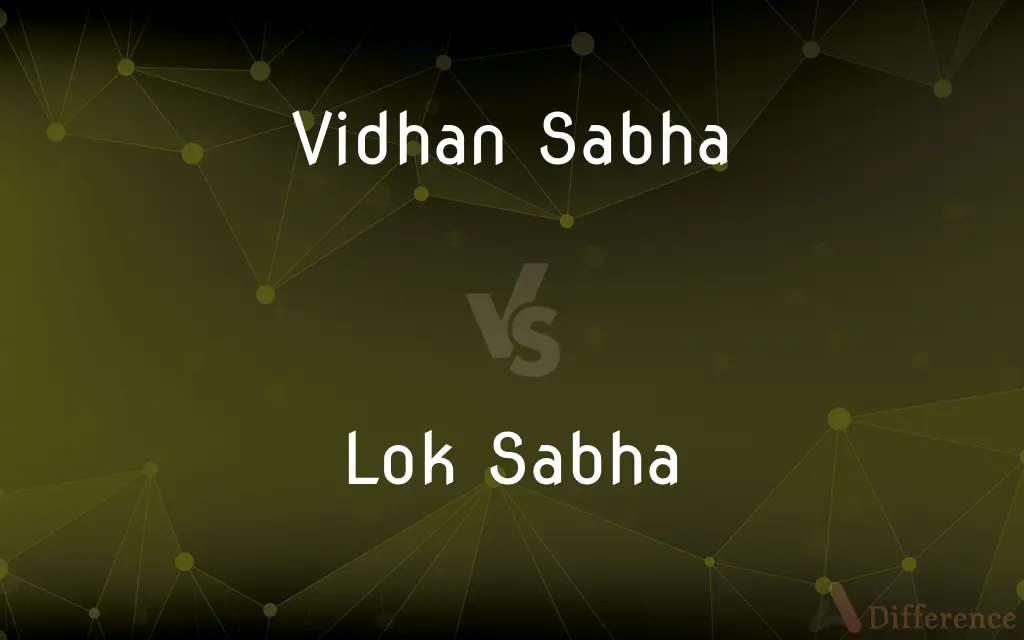Vidhan Sabha vs. Lok Sabha — What's the Difference?
By Tayyaba Rehman & Urooj Arif — Published on February 5, 2024
Vidhan Sabha is a state legislative assembly in India, while Lok Sabha is the lower house of India's national parliament.

Difference Between Vidhan Sabha and Lok Sabha
Table of Contents
ADVERTISEMENT
Key Differences
Vidhan Sabha, also known as the Legislative Assembly, is the lower house of the state legislature in Indian states and territories. Each state has its own Vidhan Sabha. The Lok Sabha, on the other hand, is the lower house of India's bicameral parliament and represents the nation as a whole.
Members of the Vidhan Sabha are elected from various constituencies within the state. In contrast, Lok Sabha members are elected from constituencies spread across the entire country. The Vidhan Sabha deals with state-level legislation and issues, while the Lok Sabha addresses national legislation and issues.
The term of a Vidhan Sabha is typically five years, unless dissolved earlier, similar to the Lok Sabha. However, the focus of the Vidhan Sabha is more on regional concerns specific to the state, whereas the Lok Sabha concentrates on national policies and laws.
The Vidhan Sabha plays a key role in electing the Chief Minister of the state, who is akin to the Prime Minister at the national level. In the Lok Sabha, the elected members play a role in forming the central government and electing the Prime Minister.
The Vidhan Sabha has powers and functions that are confined to the state's legislative matters, whereas the Lok Sabha has wider legislative powers that affect the entire country, including matters of defense, foreign affairs, and more.
ADVERTISEMENT
Comparison Chart
Level
State-level legislative assembly.
National-level lower house of parliament.
Members
Elected from state constituencies.
Elected from constituencies across India.
Focus
State-specific legislation and issues.
National legislation and policies.
Term Duration
Typically 5 years, unless dissolved earlier.
Same, 5 years, unless dissolved earlier.
Role in Government
Elects the state's Chief Minister.
Involved in forming central government and electing the Prime Minister.
Compare with Definitions
Vidhan Sabha
A forum for discussing and addressing state issues.
The Vidhan Sabha session focused on infrastructure development.
Lok Sabha
A national-level legislative body in India.
Lok Sabha members are elected in general elections.
Vidhan Sabha
The assembly responsible for state-level lawmaking.
The Vidhan Sabha debated the state budget extensively.
Lok Sabha
The lower house of India's bicameral parliament.
The Lok Sabha has a significant role in national legislation.
Vidhan Sabha
The legislative assembly electing the state's Chief Minister.
The newly formed Vidhan Sabha elected its Chief Minister.
Lok Sabha
The house that plays a key role in forming India's central government.
The majority party in the Lok Sabha formed the government.
Vidhan Sabha
The lower house of a state's legislature in India.
The Karnataka Vidhan Sabha passed a new education bill.
Lok Sabha
The house of the parliament responsible for making national laws.
The Lok Sabha passed a landmark healthcare reform bill.
Vidhan Sabha
A state-level legislative body in Indian states.
Members of the Vidhan Sabha are elected every five years.
Lok Sabha
A forum for debate and decision on national policies.
The Lok Sabha discussed foreign policy in its recent session.
Common Curiosities
Can Vidhan Sabha legislate on national matters?
No, the Vidhan Sabha is limited to state-level legislative matters.
What does the Lok Sabha represent?
The Lok Sabha is the lower house of India's national parliament, representing the entire country.
How are members elected to the Vidhan Sabha?
Members of the Vidhan Sabha are elected from various constituencies within their respective states.
Can Lok Sabha members influence state policies?
Lok Sabha members primarily focus on national policies, though they may have indirect influence on state matters.
What is the role of Lok Sabha members?
Lok Sabha members are responsible for national legislation and policymaking.
How often are Lok Sabha elections held?
Lok Sabha elections are held every five years, unless the house is dissolved earlier.
What is the Vidhan Sabha?
The Vidhan Sabha is the legislative assembly at the state level in India.
Who elects the Chief Minister in a state?
The Chief Minister is elected by the members of the Vidhan Sabha.
How does the Lok Sabha contribute to forming the central government?
The Lok Sabha members play a crucial role in forming the central government and electing the Prime Minister.
How is the Lok Sabha different in function from the Vidhan Sabha?
The Lok Sabha deals with national issues, while the Vidhan Sabha focuses on state-specific matters.
Can Vidhan Sabha members become ministers?
Yes, Vidhan Sabha members can be appointed as ministers in the state government.
What is the term duration of the Vidhan Sabha?
The term of the Vidhan Sabha is typically five years, unless dissolved earlier.
Does the Lok Sabha have a role in international matters?
Yes, the Lok Sabha discusses and legislates on national matters, including foreign affairs.
What happens if a Vidhan Sabha is dissolved?
If a Vidhan Sabha is dissolved, state-level elections are held to form a new assembly.
What kind of issues does the Vidhan Sabha address?
The Vidhan Sabha addresses issues and legislation specific to its state.
Share Your Discovery

Previous Comparison
Class in Java vs. Interface in Java
Next Comparison
NFC vs. AFCAuthor Spotlight
Written by
Tayyaba RehmanTayyaba Rehman is a distinguished writer, currently serving as a primary contributor to askdifference.com. As a researcher in semantics and etymology, Tayyaba's passion for the complexity of languages and their distinctions has found a perfect home on the platform. Tayyaba delves into the intricacies of language, distinguishing between commonly confused words and phrases, thereby providing clarity for readers worldwide.
Co-written by
Urooj ArifUrooj is a skilled content writer at Ask Difference, known for her exceptional ability to simplify complex topics into engaging and informative content. With a passion for research and a flair for clear, concise writing, she consistently delivers articles that resonate with our diverse audience.












































